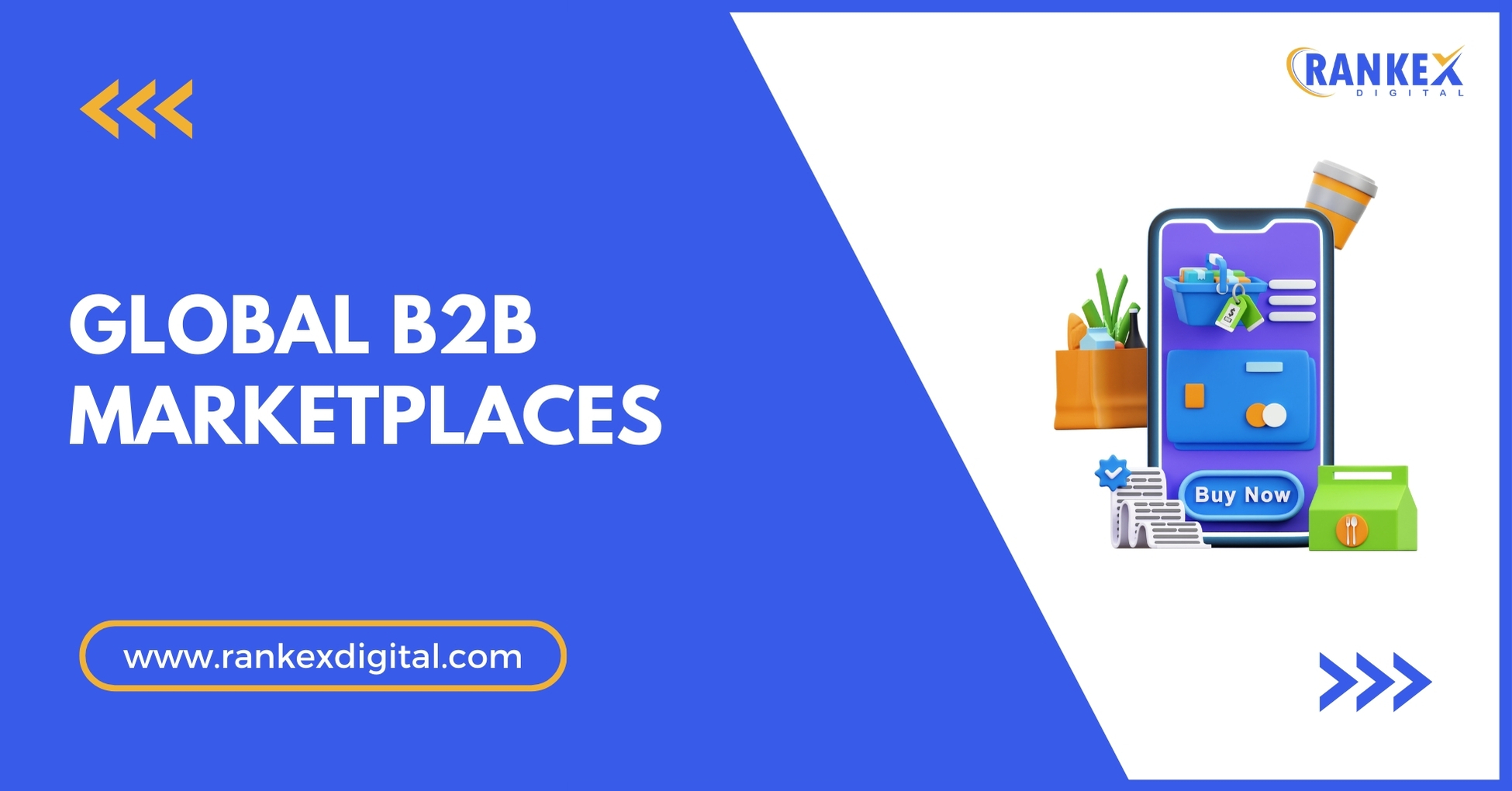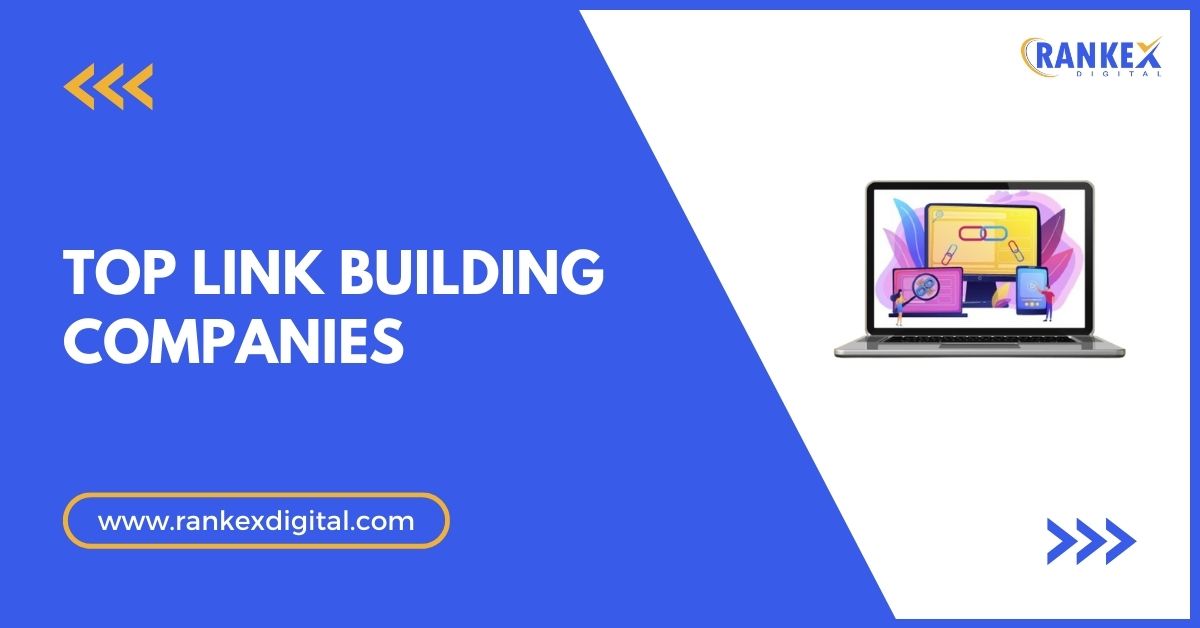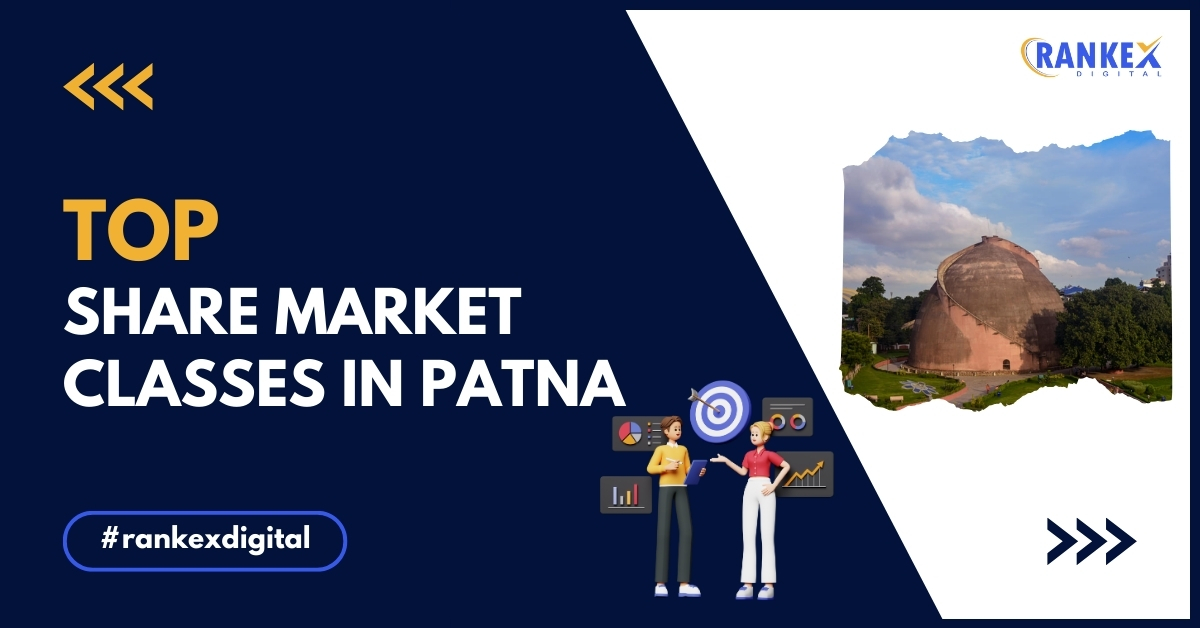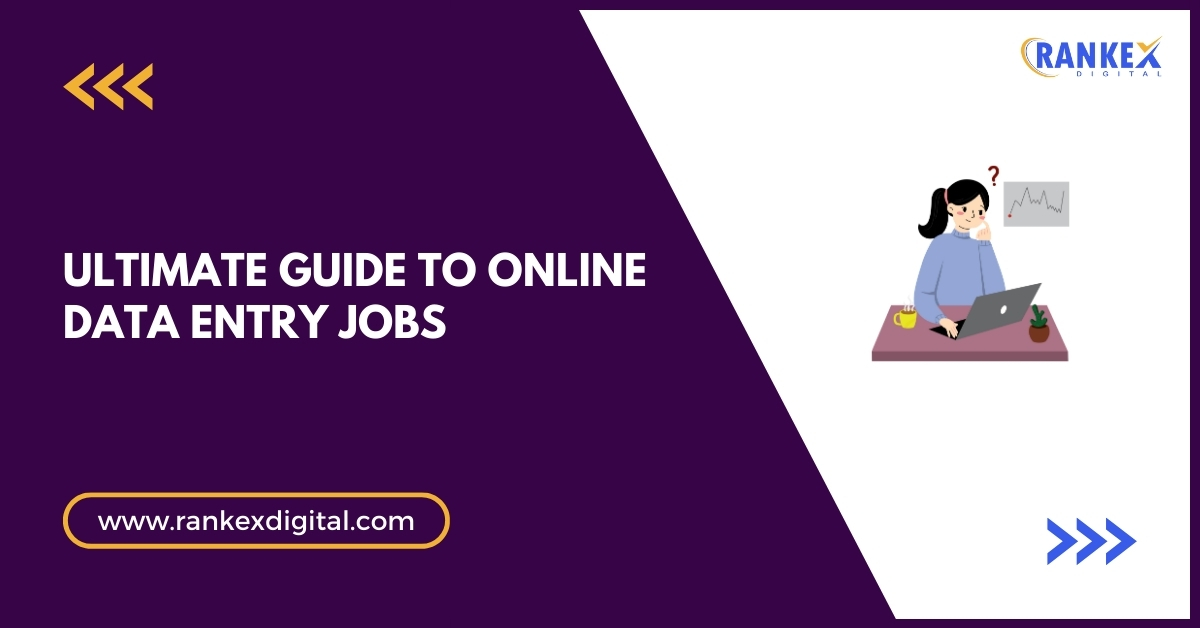Global B2B (Business-to-Business) marketplaces have revolutionized the way companies conduct trade, making it easier than ever for businesses to connect with suppliers, manufacturers, and buyers worldwide.
These online platforms streamline the buying and selling processes, offering access to a vast network of global trade partners, reducing transaction costs, and enhancing transparency.
In today’s digital economy, global B2B marketplaces are crucial for companies looking to expand their reach, discover new markets, and build international trade relationships.
Here’s an overview of the significance of global B2B marketplaces, how they work, and the top players dominating the space.
Table of Contents
Importance of Global B2B Marketplaces
Global B2B marketplaces offer several benefits to businesses, regardless of their size or industry. Some of the key advantages include:
- Wider Market Reach: Businesses can access international markets, connecting with buyers and suppliers from all corners of the world.
- Lower Costs: These platforms reduce the need for physical intermediaries, cutting down on operational costs such as travel and logistics.
- Efficiency and Convenience: B2B marketplaces provide an efficient platform for businesses to find products, compare prices, and negotiate terms, all from the comfort of their offices.
- Transparency: Many B2B platforms offer buyer protection, ensuring that businesses are engaging with legitimate, verified partners, thus reducing the risk of fraud.
- Technological Advancements: With the use of AI, data analytics, and machine learning, these platforms provide intelligent solutions, helping businesses make informed decisions.
How Global B2B Marketplaces Work
Most global B2B marketplaces operate by allowing businesses to register and create profiles either as buyers or suppliers. The process typically involves:
- Supplier Listings: Sellers list their products or services on the platform, complete with descriptions, specifications, and pricing details.
- Buyer Search: Buyers can search for products using filters such as location, industry, price range, or product category.
- RFQs and Negotiations: Buyers can send a “Request for Quotation” (RFQ) to suppliers to get quotes, compare offers, and negotiate terms.
- Order Placement: Once both parties agree on the terms, the buyer places an order through the platform, often using secure payment solutions provided by the marketplace.
- Delivery and Review: After the product is delivered, buyers can review suppliers, which helps maintain the platform’s quality and trust.
Top Global B2B Marketplaces
1. eWorldTrade
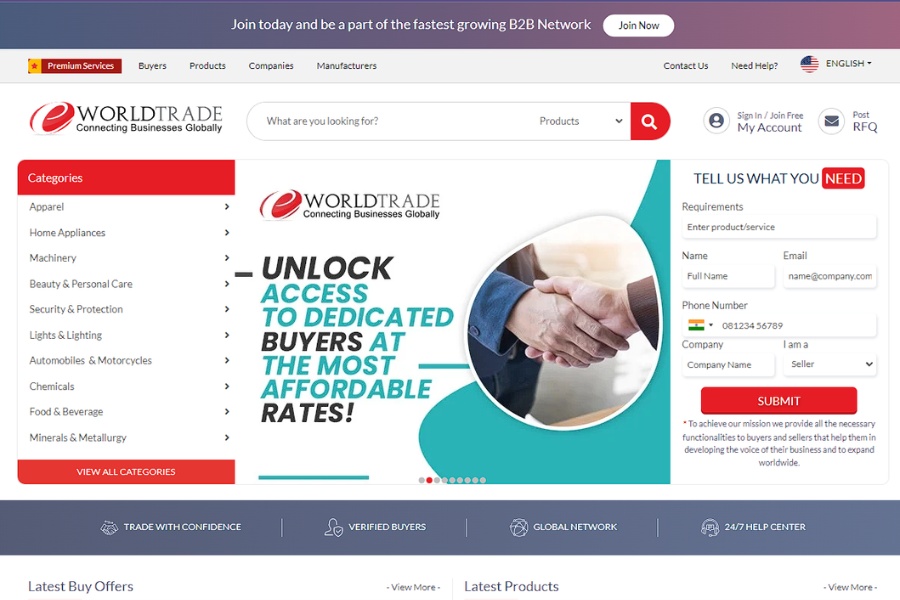
eWorldTrade has gained significant traction in the B2B marketplace ecosystem due to its emphasis on emerging markets and seamless trade solutions. It connects millions of buyers and suppliers globally, providing a trusted platform for businesses to expand.
Key Features:
- Diverse Supplier Base: eWorldTrade features suppliers from various industries, ranging from agriculture to industrial equipment.
- Secure Transactions: It offers secure trade solutions, protecting both buyers and sellers through verified profiles and secure payment methods.
- AI-Driven Solutions: The platform uses AI to match businesses with the most suitable partners based on historical transactions and business preferences.
- Mobile App Integration: eWorldTrade has an advanced mobile app, that allows businesses to track orders and communicate on the go.
Pros:
- Ideal for small and medium-sized enterprises (SMEs).
- Strong focus on emerging markets.
- Intuitive interface with extensive product categories.
- A secure trading environment with escrow services.
Cons:
- Smaller supplier base compared to giants like Alibaba.
- Limited customization options for storefronts.
eWorldTrade is a platform that offers a personalized B2B experience, making it particularly appealing to SMEs looking to establish their brand in emerging markets.
2. Alibaba

Alibaba.com remains one of the largest and most influential B2B platforms worldwide. It revolutionized the way businesses trade internationally by offering a massive supplier base and digital trade solutions.
Key Features:
- Huge Product Catalog: Alibaba boasts millions of products across every conceivable category, from electronics to clothing and machinery.
- Verified Suppliers: Many suppliers on Alibaba are verified, ensuring that businesses are dealing with trusted manufacturers and distributors.
- Trade Assurance: Alibaba’s trade assurance program offers buyer protection, covering refunds in cases of non-delivery or product discrepancies.
- Global Reach: Alibaba’s platform supports cross-border trade on a massive scale, with businesses from almost every country participating.
Pros:
- Largest global supplier base.
- Advanced digital marketing tools for sellers.
- Excellent trade assurance and buyer protection programs.
- Competitive pricing due to supplier competition.
Cons:
- Intense competition among suppliers can overwhelm buyers with options.
- Some sellers may lack transparency, leading to potential quality control issues.
With its global influence, Alibaba.com is a go-to platform for businesses seeking a vast array of products at competitive prices, though navigating its large supplier base can be a challenge.
3. Global Sources
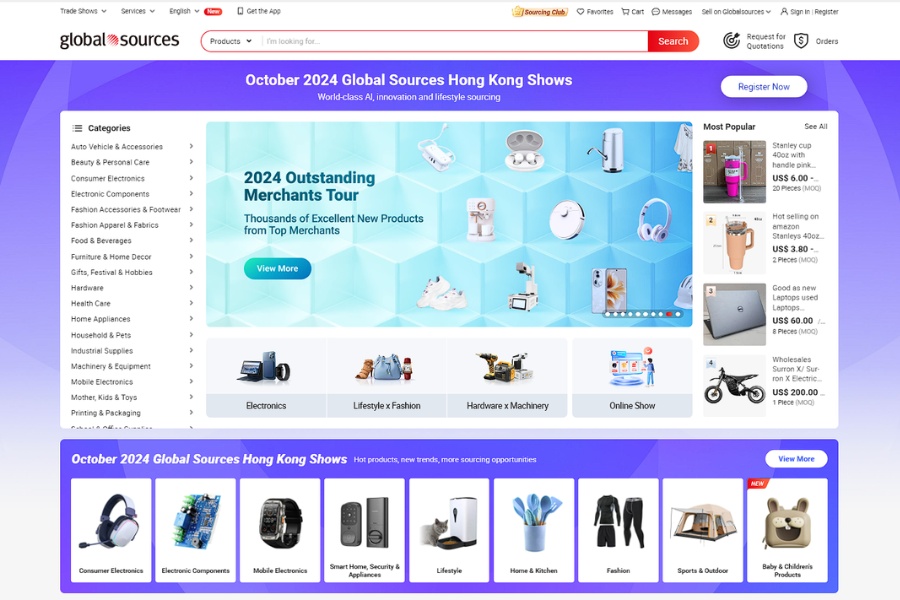
Global Sources is a well-known B2B marketplace, particularly for businesses looking to source high-quality products from Asia. It has a reputation for connecting international buyers with verified Asian suppliers, often for wholesale or manufacturing purposes.
Key Features:
- Verified Suppliers: Global Sources is stringent about supplier verification, which helps maintain high product standards.
- Trade Shows: The platform organizes trade shows across Asia, which serve as an excellent opportunity for businesses to meet suppliers in person.
- Customized Sourcing Services: The platform offers customized sourcing options for businesses looking for specific products.
- Advanced Search and Filter Options: Global Sources allows users to filter and search for products based on industry, product certifications, and company reputation.
Pros:
- Excellent for sourcing high-quality Asian products.
- Strict supplier verification processes reduce the risk of fraud.
- Offers trade shows for hands-on supplier interaction.
- It is good for buyers focused on electronics, apparel, and hardware.
Cons:
- Heavily focused on Asian suppliers, limiting geographical diversity.
- Trade shows may only cater to larger buyers or manufacturers.
Global Sources excels in providing verified Asian products and is a favorite for businesses seeking reliable suppliers in electronics and manufacturing.
4. Walmart
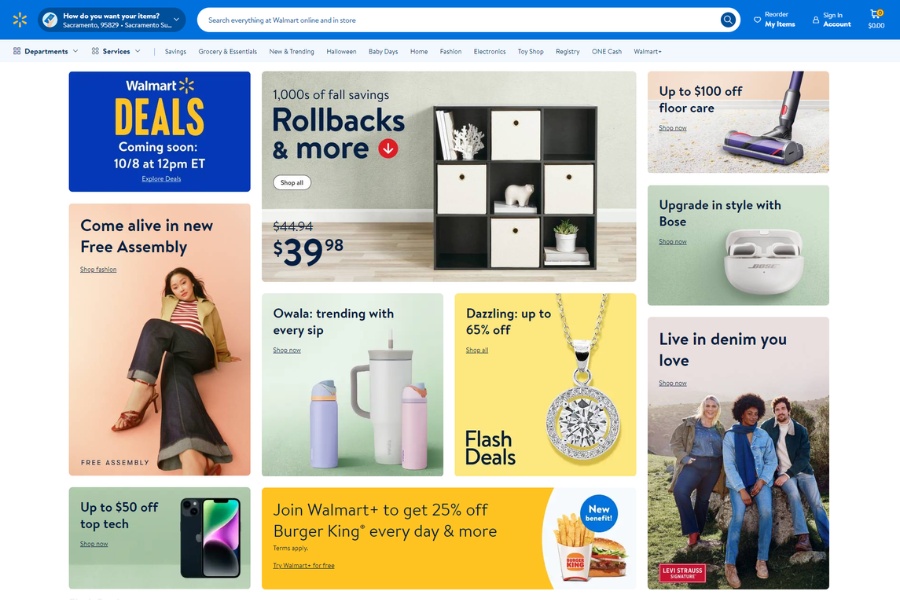
Walmart is India’s largest B2B marketplace, focusing on domestic and international trade. It connects millions of buyers and sellers across a broad spectrum of industries and also a part Global B2B marketplaces development journey.
Key Features:
- Extensive Supplier Network in India: Walmart has an extensive supplier base across different industries, from manufacturing to services.
- User-Friendly Interface: The platform has an intuitive user interface that makes it easy for businesses to browse products and suppliers.
- Mobile App: Walmart offers a powerful mobile app for convenient on-the-go access, enabling businesses to connect anytime, anywhere.
- Request for Quotation (RFQ) System: Buyers can post their specific requirements and receive quotes directly from suppliers.
Pros:
- Strong focus on USA suppliers and buyers.
- A highly efficient RFQ system streamlines the procurement process.
- Comprehensive product categories.
- Competitive pricing due to a large supplier base.
Cons:
- Primarily focused on the USA market, limiting its global scope.
- Quality control can be inconsistent with some suppliers.
Walmart is an excellent option for businesses looking to tap into the growing market, with a user-friendly platform and competitive pricing.
5. ThomasNet

ThomasNet, also known as Thomas, is a North American B2B marketplace focused primarily on industrial products and services. It has a long-standing reputation for being a trusted source of suppliers, particularly in the manufacturing sector.
Key Features:
- Industrial Focus: ThomasNet is specifically tailored for businesses looking to source industrial and manufacturing products, from raw materials to finished goods.
- Supplier Diversity: The platform includes a wide range of certified suppliers, including those in niche markets.
- Detailed Supplier Profiles: ThomasNet provides in-depth supplier profiles, including certifications, product details, and customer reviews.
- RFQ Capabilities: The platform has an advanced RFQ system to simplify the procurement process for industrial buyers.
Pros:
- Ideal for sourcing industrial goods and services.
- Extensive information on supplier certifications and capabilities.
- Tailored for North American manufacturers and buyers.
- Trusted platform with over 120 years in business.
Cons:
- Focused primarily on North American suppliers, limiting international options.
- Niche focus on industrial and manufacturing sectors may not cater to all industries.
ThomasNet’s rich history and industrial focus make it a trusted platform for businesses in the manufacturing and industrial sectors, particularly in North America.
Conclusion
In 2025, the global B2B marketplace ecosystem is more robust than ever, offering businesses a range of platforms to suit their needs.
eWorldTrade stands out for its SME focus and AI-driven matching, while Alibaba.com remains a dominant force with its vast supplier network.
Global Sources provides quality sourcing from Asia, IndiaMART excels in connecting businesses with Indian suppliers, and ThomasNet remains a trusted platform for industrial sourcing in North America.
Each of these platforms offers unique features, pros, and cons, making them suitable for different types of businesses and markets.

